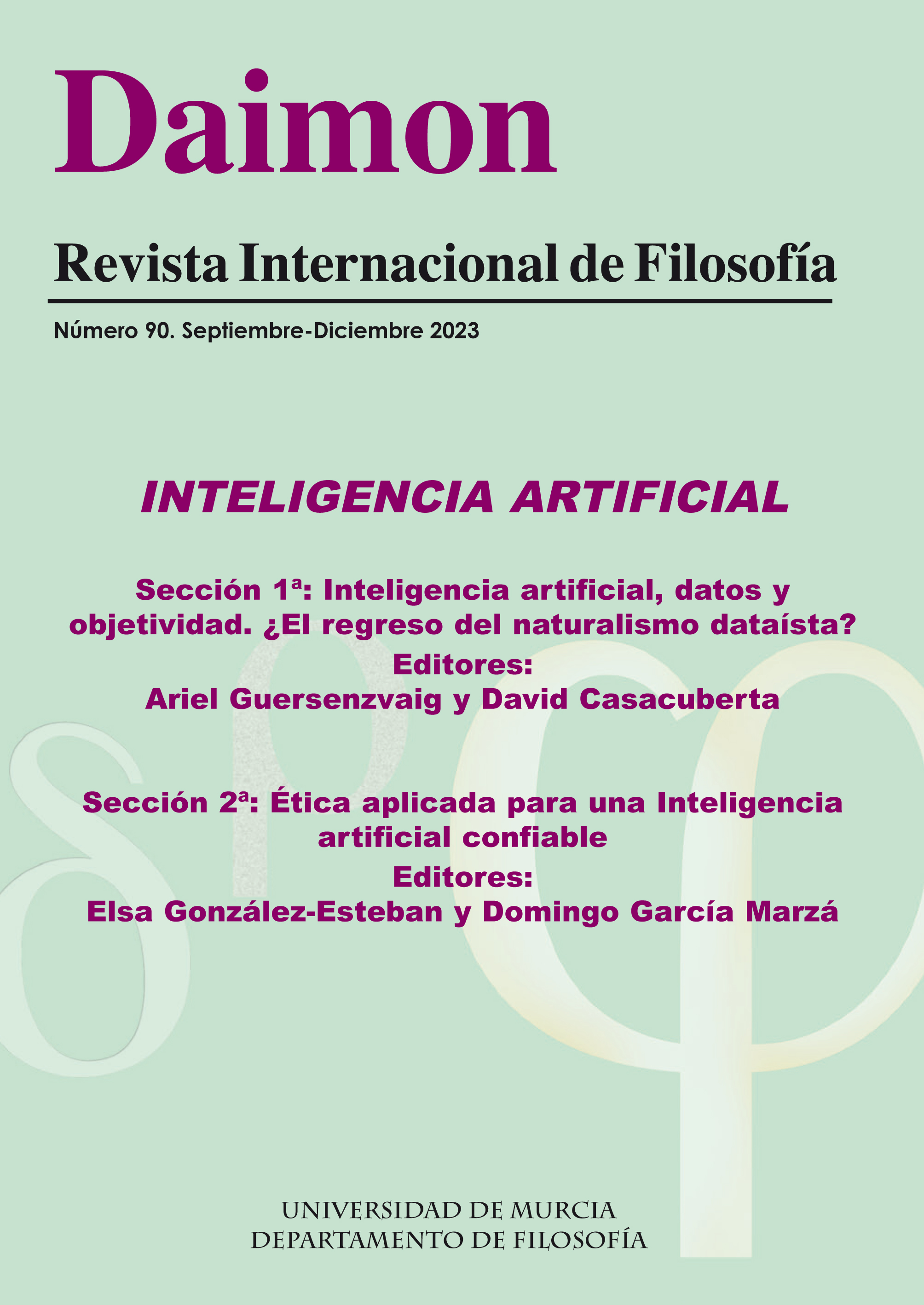Presentación de la sección sobre Inteligencia artificial, datos y objetividad. ¿El regreso del naturalismo dataísta?
Agencias de apoyo
- Grupo de Investigación consolidado HIMTS (Human, Interaction, Materials, Technology, and Society) y grupo consolidado GEHUCT (Grupo de Estudios Humanísticos en Ciencia y Tecnología)
Resumen
Presentación de la sección sobre Inteligencia artificial, datos y objetividad. ¿El regreso del naturalismo dataista? en el Monográfico sobre Inteligencia Artificial de Daimon - Revista Internacional de Filosofía. Nº 90 (septiembre - Diciembre 2023).
Descargas
-
Resumen795
-
PDF510
-
HTML135
Citas
Awad, E., Dsouza, S., Kim, R., Schulz, J., Henrich, J., Shariff, A., Bonnefon, J.-F., & Rahwan, I. (2018). The Moral Machine experiment. Nature, 563(7729), 59-64. https://doi.org/10.1038/s41586-018-0637-6
Blakeley, J. (2020). We built reality: How social science infiltrated culture, politics, and power. Oxford University Press.
Brooks, D. (2013, Feb 4) The Philosophy of Data. The New York Times. Consultado 01/07/2023 desde https://www.nytimes.com/2013/02/05/opinion/brooks-the-philosophy-of-data.html
Cho, M. K., & Martinez-Martin, N. (2022). Epistemic Rights and Responsibilities of Digital Simulacra for Biomedicine. The American journal of bioethics : AJOB, 1–12. Advance online publication. https://doi.org/10.1080/15265161.2022.2146785
Desrosières, A. (1993). La politique des grands nombres: Historie de la raison statistique. Éditions La Découverte.
Eticas Foundation. (2021) Sesgo de calificación crediticia y reproducción de desigualdad en préstamos para vivienda. Consultado 01/07/2023 https://eticasfoundation.org/es/sesgo-de-calificacion-crediticia-y-reproduccion-de-desigualdad-en-prestamos-para-vivienda/
Foot, P. (1967). The Problem of Abortion and the Doctrine of Double Effect. Oxford Review, 5, 5-15.
Casacuberta, D., Guersenzvaig, A. Using Dreyfus’ legacy to understand justice in algorithm-based processes. AI & Soc 34, 313–319 (2019). https://doi.org/10.1007/s00146-018-0803-2
Hacking, I. (1990). The Taming of Chance. Oxford University Press.
Hadwick, David & Lan, Shimeng. (2021) Lessons to Be Learned from the Dutch Childcare Allowance Scandal: A Comparative Review of Algorithmic Governance by Tax Administrations in the Netherlands, France and Germany. World tax Journal. 13(4), 609-645.
Lewontin, R. (1993). Biology as Ideology: The Doctrine of DNA. Harper Perennial.
Morales Moreno, A. M. (2021). Algoritmos en el estrado, ¿realmente los aceptamos? Percepciones del uso de la inteligencia artificial en la toma de decisiones jurídico-penales. Ius et Scientia, 7 (2), 57-87. https://doi.org/10.12795/IETSCIENTIA.2021.i02.05
Moingeon, P., Chenel, M., Rousseau, C., Voisin, E., & Guedj, M. (2023). Virtual patients, digital twins and causal disease models: Paving the ground for in silico clinical trials. Drug discovery today, 28(7), 103605. https://doi.org/10.1016/j.drudis.2023.103605
Porter, T. (2020). Trust in Numbers: The Pursuit of Objectivity in Science and Public Life, new edition. Princeton University Press.
Sánchez-Monedero, J., & Dencik, L. (2022). The politics of deceptive borders: ‘biomarkers of deceit’ and the case of iBorderCtrl. Information, Communication & Society, 25(3), 413-430. https://doi.org/10.1080/1369118X.2020.1792530
Tewari, I., & Pant, M. (2020). Artificial Intelligence Reshaping Human Resource Management : A Review. 2020 IEEE International Conference on Advent Trends in Multidisciplinary Research and Innovation (ICATMRI), Buldhana, India. https://doi.org/10.1109/ICATMRI51801.2020.9398420
Valle-Cruz, D., Fernandez-Cortez, V., & Gil-Garcia, J. R. (2022). From E-budgeting to smart budgeting: Exploring the potential of artificial intelligence in government decision-making for resource allocation. Government Information Quarterly, 39(2), 101644. https://doi.org/https://doi.org/10.1016/j.giq.2021.101644
Derechos de autor 2023 Daimon Revista Internacional de Filosofia

Esta obra está bajo una licencia internacional Creative Commons Reconocimiento-NoComercial-SinObraDerivada 3.0.
Las obras que se publican en esta revista están sujetas a los siguientes términos:
1. El Servicio de Publicaciones de la Universidad de Murcia (la editorial) conserva los derechos patrimoniales (copyright) de las obras publicadas, y favorece y permite la reutilización de las mismas bajo la licencia de uso indicada en el punto 2.
2. Las obras se publican en la edición electrónica de la revista bajo una licencia Creative Commons Reconocimiento-NoComercial-SinObraDerivada 3.0 España (texto legal). Se pueden copiar, usar, difundir, transmitir y exponer públicamente, siempre que: i) se cite la autoría y la fuente original de su publicación (revista, editorial y URL de la obra); ii) no se usen para fines comerciales; iii) si remezcla, transforma o crea a partir del material, no podrá distribuir el material modificado.
3. Condiciones de auto-archivo. Se permite y se anima a los autores a difundir electrónicamente las versiones pre-print (versión antes de ser evaluada) y/o post-print (versión evaluada y aceptada para su publicación) de sus obras antes de su publicación, ya que favorece su circulación y difusión más temprana y con ello un posible aumento en su citación y alcance entre la comunidad académica. Color RoMEO: verde.











